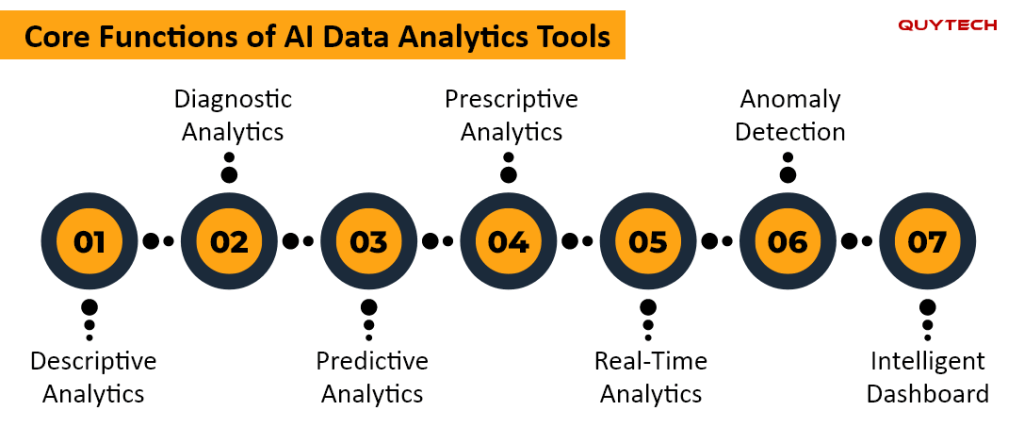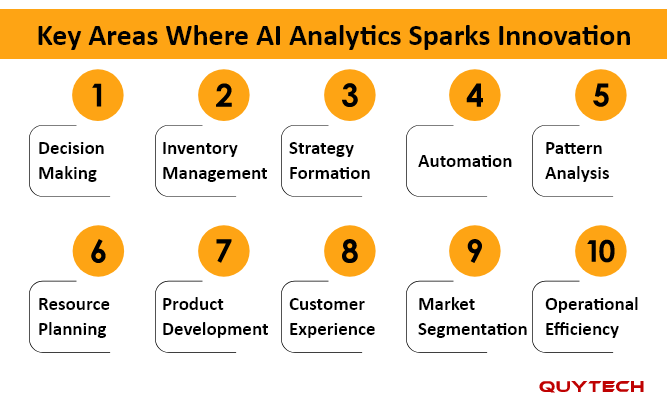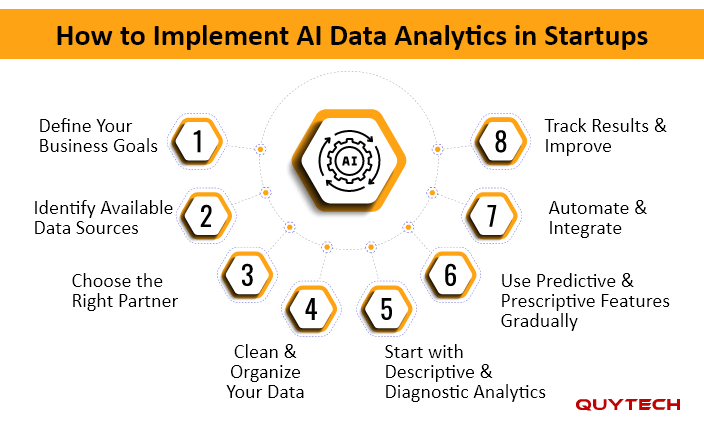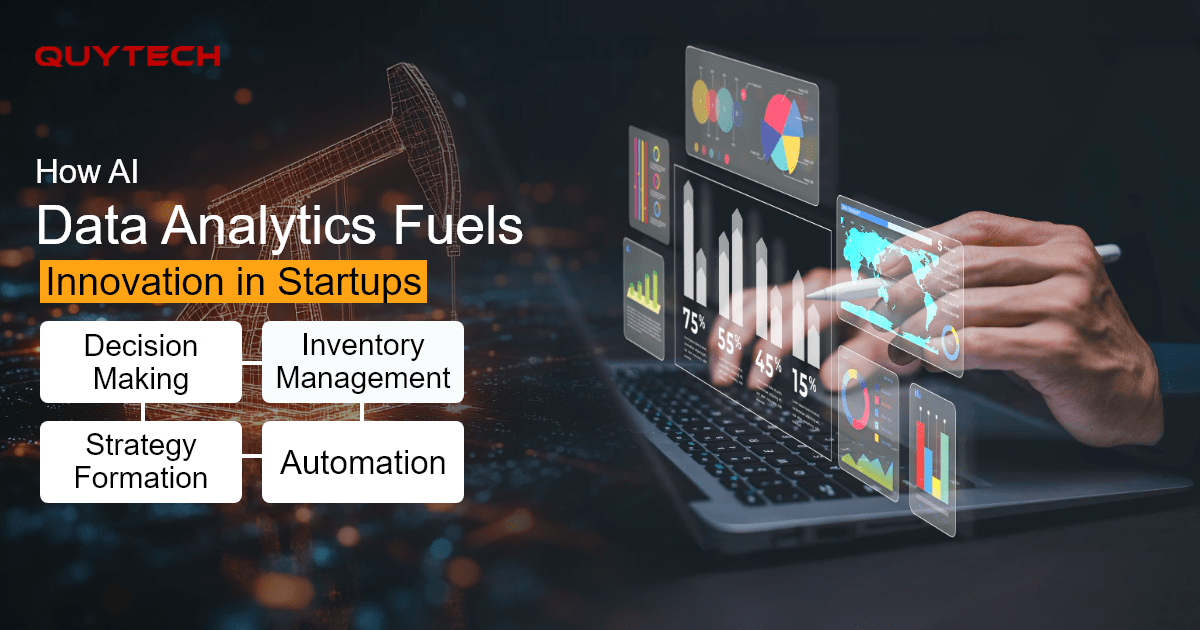Early-stage success can often mask the need for evolution. Many startups begin with a strong market presence but gradually face decline. Even after putting in all possible efforts, the decline continues. The reasons that can provide a solution are often not paid attention to, and decisions are made based on experience and assumptions.
That’s where AI data analytics comes into action. It identifies the areas and reasons for the downfall with the help of analytics and offers insights with the help of prescriptive analytics. It helps startups evolve to cope with the dynamic market changes and trends.
This blog covers how AI data analytics assists startups in utilizing data analytics to accurately determine customer demands, spot market trends, implement strategies effectively, and adopt innovative approaches.
Market Stats
- As per the Market.us report, the global AI in data analytics market is expected to grow at a 29.0% CAGR and reach USD 236.1 billion by 2033.
- Predictive analytics accounted for about 32.56% of total revenue, the greatest proportion of the AI data analytics market in 2024.
- A report by Impact states that businesses can see up to 23x higher client acquisition rates and roughly 19x better profitability when utilizing data analytics.
- With a substantial 31.75% market share, North America became the largest region in the global data analytics market in 2024.
How AI Data Analytics Helps Startups Grow
The foundation of a startup is an idea that brings change and innovation. But with limited resources and market exposure, the implementation process often gets overpowered by instincts and experience. To cope with the dynamic market, startups need to update their strategies and decision-making processes.
One way to facilitate this change is to utilize AI data analytics. Data analytics helps startups make smarter decisions by utilizing the data generated during various processes. It analyzes the data, depicts the patterns and trends it follows.
With Artificial Intelligence and data analytics, startups perform better in terms of productivity and cost effectiveness. They also gain the edge that makes them stand out from competitors.
Core Functions of AI Data Analytics Tools
AI Data analytics tools for startups make the difference by offering more than simple charts and graphs. The following explains the core functions of AI-powered data analytics:

Descriptive Analytics
AI data analytics utilizes descriptive analytics for informed decision-making. Descriptive analytics works by analyzing historical data and identifying the performance, productivity, operations, etc., and then making strategic decisions based on them.
Diagnostic Analytics
Diagnostic analytics performs the function of finding the reasons behind certain outcomes. It determines the reasons behind the outcomes or incidents based on correlations, causes, and factors.
Predictive Analytics
Data analytics integrated with AI models provides predictive analytics that helps predict future outcomes. Predictive analytics works by analyzing past data patterns and trends to identify possible future outcomes.
Prescriptive Analytics
Prescriptive analytics goes a step further and offers insights derived from the data. It utilizes the predictions made by predictive analytics and provides suitable solutions and suggestions based on those.
Real-Time Analytics
Real-time analytics functions by gathering data from numerous sources and analyzing it in real-time. It helps in providing data on the spot for quick decision-making.
Anomaly Detection
The anomaly detection function analyzes and identifies possible threats with accuracy. This assists the startups in identifying anomalies as they arise and taking actions as the event unfolds to prevent any loss.
Intelligent Dashboard
Collected and analyzed data in its technical form can be hard to interpret and make decisions from. Intelligent dashboards allow easy interpretation by creating simple visualizations like trend lines and performance indicators.
Read More: Data Analytics in Manufacturing: Simplifying the Data with AI
Key Areas Where AI Analytics Sparks Innovation
Startup Data Analytics using AI offers more than tools and techniques. It enhances overall operations and productivity, along with improved strategic decision-making processes. Here are some key areas where AI data analytics sparks innovation:

Decision Making
AI helps the decision makers by highlighting what’s best for the organization. It derives decision-related insights based on data, which ensures that it is backed with facts and evidence and not influenced by instincts and assumptions.
Inventory Management
Maintaining the inventory plays an important role in the operational setting of the organization. Overstocked or understocked inventory can cause wastage and loss to the organization. Data analytics tools ensure that the inventory is managed effectively by considering the purchase patterns and optimal inventory levels.
Strategy Formation
AI for data analytics assists in strategy formation by analyzing past trends and future growth objectives. It helps in giving insights based on historical data. AI models facilitate future forecasting that helps decision-making and strategy development.
Automation
AI tools automate repetitive tasks like data entry, organizing reports, etc. They perform these tasks without human assistance. It helps in directing human efforts to higher-level activities.
Pattern Analysis
Data analytics tools for startups help in depicting patterns in data. These patterns can be customer buying behaviour, sales trends, seasonal variations in markets, etc. These patterns play a prominent role in strategy formulation and setting objectives.
Resource Planning
One of the most significant areas that AI data analytics assists in is planning resources. Analytics helps in highlighting the points where the resources are being overutilized and directs them to the areas where resources are underutilized to create operational balance.
Product Development
In product development, AI data analytics analyzes the customer data, preferences, and feedback be it from online forums or from offline suggestions. It utilizes the data to create a product designed to satisfy the customers and enhance their experience.
Customer Experience
Data analytics tools for startups provide customers with solutions personalized to their needs. This makes the customers feel more understood and valued. It also enhances their interactions and brand experience.
Market Segmentation
With the help of AI data analytics, startups can effectively segment their audiences based on criteria other than the basic location, age, gender, and lifestyle ones. It segments the customers based on their interests, purchase patterns, wishlists, etc.
Operational Efficiency
Startup data analytics using AI aids in identifying areas with operational inefficiencies and directs investments to the areas that are beneficial. AI analytics also helps in detecting possible machinery, equipment, or operation failures and prepares for them in advance.
Read More: Top Mobile App Ideas for Startups in 2025: Innovative 120+ Ideas.
Industry-Wise Applications of AI Analytics
AI data analytics is transforming the traditional work approaches of different industries. Here are some of the industry use cases of AI-based data analytics:
Manufacturing
- AI data analytics predicts machinery failure to avoid idle time in manufacturing.
- Maintains product quality and reduces wastage
- Forecasts demand and manages inventory levels
Logistics & Supply Chain
- Predicts shipping delays and customer expectations
- Enhance warehouse space utilisation and inventory tracking
- Automate demand forecasting to improve inventory control
Finance
- Real-time detection of fraudulent transactions
- Customise consumers’ finance-related advice and expedite loan approvals
- Automate compliance monitoring and regulatory reporting
Healthcare
- In healthcare, AI analytics use past data to forecast the health risks of patients.
- Encourage quicker and more precise diagnosis and optimise appointment scheduling.
- Track patient vitals and keep an eye out for any irregularities
Education
- Analytics in the education sector monitor student development and provide individualised learning pathways.
- Examine the efficacy of the course and student participation
- Estimate the risk of dropout and enhance retention tactics
Infrastructure
- Early detection of wear and tear helps prevent expensive malfunctions.
- Examine utilisation to save expenses and energy waste.
- Monitor the performance of infrastructure and equipment in real time.
Retail
- In retail, it forecasts product demand to maximise stock levels.
- Recognise shopping trends to enhance offerings and layout.
- Adapt prices according to previous sales data, seasons, and trends.
Read More: Data Analytics in Telecom Industry – Top Use Cases

How to Implement AI Data Analytics in Startups
Gaining a competitive edge with the implementation of AI data analytics in your startups will require you to follow the following steps:

Define Your Business Goals
For implementing analytics into your startup, you should first define the objectives. Highlighting the painpoints, like inefficient operations or customer retention, helps in creating effective strategies and a roadmap to follow.
Identify Available Data Sources
Audit your existing data from different sources like customer orders, phone queries, spreadsheets, suggestion boxes, staff feedback, etc. This data can help in an accurate analysis.
Choose the Right Partner
A cost-effective approach for implementing analytics is partnering with outsourced experts. It will help you acquire experienced and talented partners to implement effective strategies, deployment, etc, without in-house investments.
Clean and Organize Your Data
Once you have gathered sufficient data, start cleaning and organizing your data. It includes separating structured and unstructured data and removing noise or unwanted data as it can impact the quality of analysis.
Start with Descriptive & Diagnostic Analytics
Post cleaning and organizing, begin the analysis with descriptive and diagnostic analytics. It will help you in understanding the incidents and their causes to decide the appropriate course of action.
Use Predictive and Prescriptive Features Gradually
Once the incident and its causes are uncovered, utilize predictive and prescriptive features. It will help in providing valuable insights about the future possibilities and assist in planning suitable actions for them.
Automate and Integrate
Integrate analytics tools with different departments and areas to derive insights and automate repetitive tasks like report management, data entry, etc. This will not only save time but also the human efforts which can then be directed to other priority tasks.
Track Results and Improve
Track the results from time to time to keep track of activities and their productivity. Update regularly and improve in case of any deviation.
Quytech’s Approach to Empowering Startups with AI Analytics
Quytech builds the best AI data analytics tools for startups to make informed decisions based on data-driven insights. Our team of expert developers offers you customized and scalable solutions catering to your needs.
We work closely with your team to craft solutions aligned with your vision and goals. With solutions like predictive tyre analytics, where we developed an AI-powered analytics system enabled with real-time alerts, predictive failure analytics, and a performance monitoring system, and PRAAVI HRMS for HR analytics and employee data management, we deliver AI that drives efficiency and growth. We emphasize providing you with solutions that help your startups gain a competitive advantage and rise in the market with data-based insights.
Developed an AI-powered tyre maintenance solution for a leading fleet operator with 1500+ trucks, enabling real-time alerts, predictive failure analysis, and centralized tyre performance monitoring to reduce breakdowns and optimize operations.
Conclusion
We are in an era where startups are adopting a futuristic approach for every minor to major operation to create a stronger market presence. In times like these, depending upon intuition-based decision making is no longer effective. AI data analytics tools are the change that every startup needs.
AI data analytics tools for startups come with advantages like operational efficiency, cost-effectiveness, enhanced management, and strategic decision-making. They play a significant role in transforming the way startups operate. Adopting artificial intelligence tools and data analytics is the step to gain a proactive mover advantage.
FAQs
Implementing AI data analytics tools in your startup should be done as early as possible. It will not only assist in better decision-making and efficiency but also give a technological edge.
You can outsource data scientists and engineers to implement AI data analytics in your startup. This will equip you with experienced and skilled talent in a cost-effective way.
The time for AI data analytics implementation depends on the type of solutions you desire. A simpler solution may take comparatively less time than a feature-packed one.
Yes, AI data analytics can be integrated with your existing platforms for smoother and efficient operations.


